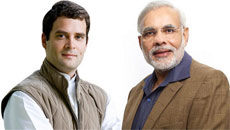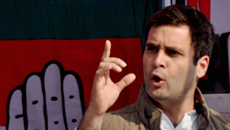President Zail Singh could not get through to then prime minister Rajiv Gandhi when he needed most to, when thousands upon thousands of Sikhs needed him to, urgently. It was after all a matter of life and death for them.
"We tried all day," Tarlochan Singh, press secretary to the president through those deathly days of 1984, and later chairman of the Nation Commission for Minorities, said at an event last week at the launch of the book '1984 - the Anti-Sikh Violence and After' that I have written. I was then eyewitness to much of the violence as a crime reporter with The Indian Express newspaper.
But all day and late into the night the president could not get a word in, Tarlochan Singh said in his startling revelation. That kind of stonewalling between the head of state and head of government was unprecedented.
Rajiv Gandhi had been sworn in prime minister on the evening of October 31; his mother, prime minister Indira Gandhi, had been assassinated by two Sikh police bodyguards earlier in the day.

Zail Singh had learnt almost before anyone else, just how direly threatened Sikhs were then in Delhi. "The President was the first Sikh to be attacked," senior lawyer H.S.Phoolka, who has been campaigning for justice over the 1984 killings, told the gathering. The president's car was stopped and attacked early in the evening of October 31 while he was on his way to the All India Institute of Medical Sciences where Indira Gandhi had been taken.
The president could hardly have been expecting the new prime minister to display some of the hostility he had encountered on the street the evening before. Because hostility this evidently was; Rajiv Gandhi then undoubtedly was a son grieving over the shocking murder of his mother, but he was also prime minister. Surely, his personal grief was not such that he couldn't set it aside a minute for the sake of the president.

Rajiv Gandhi's silence spoke unmistakably; he knew that Sikhs were being attacked all over Delhi the next day but demonstrated that he really did not want to know. Tarlochan Singh believed the president wanted to express concern over the safety and security of Sikhs. But if all he wished to do was to reach out to Rajiv Gandhi over his personal loss, it would still appear hostile to refuse to take that call.
Tarlochan Singh's intervention at the meeting added a new dimension to a chapter on Rajiv Gandhi in the book, where I present facts to show that the killing of those thousands of Sikhs was backed - at the least I argue - by "passive aggression" coming personally and directly from Rajiv Gandhi.
Yet more inputs arose at the meeting pointing the same way, by way of a glimpse of the personal responses of the Lt. Governor of Delhi, P.G.Gavai. "He wept and wept because he said he had failed," Capt. J.S.Gill, an associate of Gavai, told the meeting.

Why did Gavai think he had failed? The book records a telling documented fact, that Rajiv Gandhi called Gavai for a meeting at 5.30 pm on November 2 and instructed him that all violence must end within 15 minutes.
This was the first firmly decisive step Rajiv Gandhi took. But by then 3,000 Sikhs had already been killed. Did Rajiv Gandhi not know before then that Sikhs were being massacred? What was Rajiv Gandhi ordering Gavai to end, now suddenly within 15 minutes.
The killing, and the loot and arson were in evidence all over Delhi, and Rajiv Gandhi was hardly ignorant of these. He most certainly would want the violence to end on the evening of Nov 2 because among other considerations, world leaders had begun to arrive in the city for Indira Gandhi's funeral to take place the following day.

Perhaps he had a more humane intention, eventually, than preparing a presentable city before foreign dignitaries. But before that meeting with Gavai, no such decisive move came from the new prime minister to end the violence.
Rajiv Gandhi had no doubt delivered a speech calling for peace and harmony. But to share here a thought in the book: "The Sikhs of Delhi did not need to hear speeches on the right thing to do; they needed the right thing done." This, clearly and tragically, was not.
Gavai too had seen that, how could he not? He was agonized because he found himself powerless to do any earlier what he knew it would take. What as that? And who or what restrained him? Another question answers that question.

In the course of an interview with former police commissioner Ved Marwah, the question arose who had stopped his inquiry from completion at the last minute. Marwah would not answer the question, but he did offer an answer by way of raising the question: "Who else?"
( Sanjay Suri is the author of '1984 - the Anti-Sikh Violence and After' (Harper Collins). The views expressed are personal. He can be contacted at sanjaysuri@me.com
He was a young crime reporter with The Indian Express newspaper in New Delhi when Prime Minister Indira Gandhi was assassinated by her bodyguards on 31 October 1984.
He was among the few journalists to experience the full horror of the anti-Sikh violence that followed and carried on unchecked for the next couple of days, while the police looked the other way. He saw a Congress MP demanding the release of party workers who had been arrested for loot. He had a narrow escape from a gang of killers while out reporting.
He later filed affidavits that included eyewitness accounts relating to two Congress MPs, and confronted former Prime Minister Rajiv Gandhi at an election rally. Suri also testified before several commissions of inquiry set up to investigate the massacres-though very little came of these.
In his book, he brings together a wealth of fresh revelations, arising from his own experiences, and from extensive interviews with police officers then in the front line of facing the violence. Humane but chilling, Suri's account is backed by a thorough examination of existing records and the provisions of the Indian legal system.
Taking a close look at the question of the Congress hand behind the brutalities and why the survivors continue to wait for justice even thirty years later, 1984: The Anti-Sikh Violence and After remains urgent even today. )




